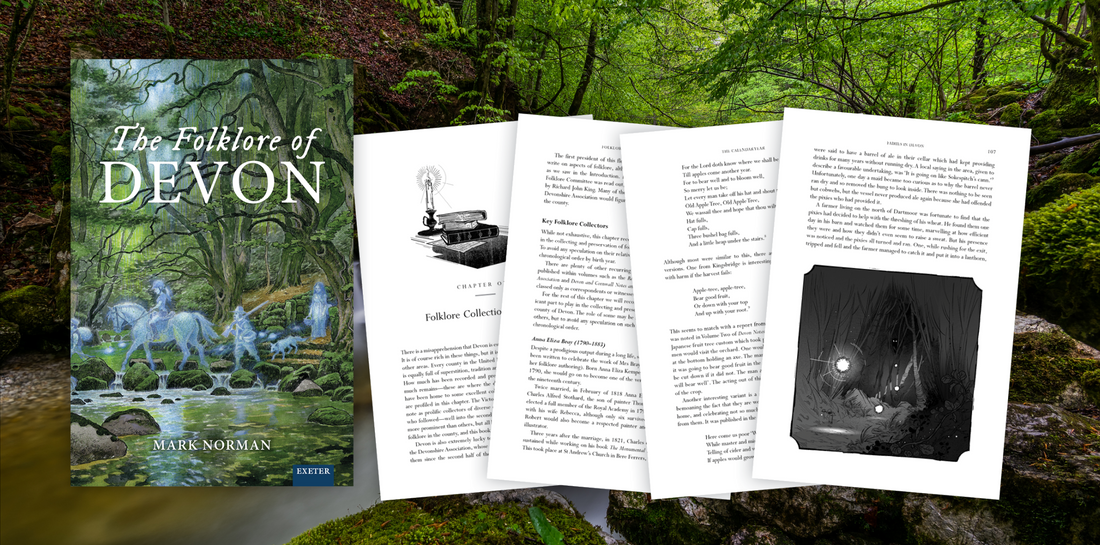Mark Norman talks to us about The Folklore of Devon.
Could you tell us a little about your background and when your interest in folklore began?
My interest in folklore developed from a not uncommon childhood interest in the paranormal, fuelled by classic school library titles such as the 'Usborne Mysteries of the Unexplained: Ghosts'. Over time, this interest gradually moved from hard paranormal and supernatural subjects to the much more fluid area of folklore, which is concerned not with the 'truth' of such topics, but rather their continuity and social aspects - why people believe things and how stories change and develop over time.
I originally worked in television but tired of the cut-throat nature of the business, and working in the city and so returned to my native Devon where life is much more pleasant. I took a degree in Social Science with Media as a reskilling exercise but continued to use by previous background in various aspects of content creation.
2015 was an interesting year as my first book was published, looking at spectral black dog folklore, and I began my folklore-themed podcast, 'The Folklore Podcast'. This was only ever going to be a small hobby but it hit a market niche at the right time and grew into the what it is today - eight seasons later and with over 1.75 million downloads. Its large global audience has been very useful for securing other publishers and hence all of my books have been traditionally published since then.
White

White
What inspired you to write The Folklore of Devon and how does is compare to other titles focused on the topic?
The inspiration for 'The Folklore of Devon' was most definitely 'The Folklore of Cornwall', published by Exeter Press a year or two before my book. This was sent to me for review and was an excellent summary of the folklore of the county, but at the same time it made me realise that the last proper study of Devon folklore was made in the 1970s, and that was by someone who didn't even live in the county.
I have always been very passionate about our local customs and traditions and so felt that everything had fallen into place, and that I should put in a proposal for a similar treatment for Devon. The rest, as they say, is history.
White
How did you approach the research for the book?
It is all too easy these days for people to hop online and use the internet for research, and there is nothing wrong with that. But Devon has a long-standing history of folklore collection in the field, and the Devonshire Association have over a century of this material in their archives. This was a logical starting point, along with research in other archives. From here, I was able to broaden out my research as it was important to draw comparisons and show similarities with the lore of other areas of the country (and sometimes beyond). Academic journals and books available online and in libraries provided the material for this.
White

White
What was the most surprising thing you learned during your research?
Nothing particularly surprises me in terms of folklore any more - there are so many weird and wonderful tales to explore. But I was very happy to be able to prove that a particular custom regarding the scattering of hemp seeds was undertaken by both boys and girls in the county, where it was usually only attributed to girls. This was something that even the peer reviewer for the manuscript was unaware of!
White
Do any of the tales in the book stand out as favourites?
I can't single out a single tale, but it was especially gratifying to be able to write a chapter on modern and digital folklore and how this relates to Devon. People often assume that folklore is just about 'old stuff' and it was good to be able to demonstrate that this is not the case and to bring studies of folklore in Devon into the 21st century.
White

White
Who is the target audience for the book and what do you hope readers will take away from the experience?
Although this is a book published by an academic press and it is, as you would expect for such a title, very full of references I have been very careful to retain my usual writing style, which is that of academic rigour but accessible language and hence the target audience is really anyone with an interest in folklore and tradition generally, and that of the county of Devon in particular. If readers should take anything away from this book, it is that folklore is as relevant to us now as it ever was, and that actually you knew far more than you realised, because you use and interact with folklore every single day - you just don't necessarily know it.
White
White
Learn more about The Folklore of Devon and order your copy here.
All illustrations by Rhianna Wynter.







